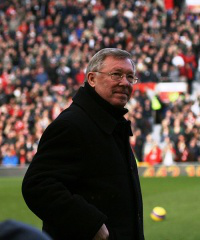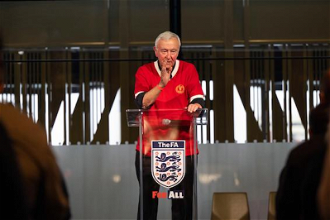Mark Dowd reflects on the life and times of Sir Alex Ferguson

Sir Alex Ferguson
It was an event that, in terms of impact, allegedly out-tweeted the death of Mrs Thatcher. It reduced grown men to tears and rendered the Queen´s Speech a trifling irrelevance.
When the news broke of Sir Alex Ferguson´s decision to vacate the hot seat at Manchester United, I must confess that, as a lifelong Red, I identified with the talk of 'bereavement'. As the MUFC Facebook page urged us all to send a message of thanks to 'the boss', I pondered my own sense of gratitude to a 71 year old man who had, some few brief minutes with him a few years back, cured me of the dangerous pagan tendency towards superstition and idolatry.
It all goes back to 1975 when I was a 15 year old boy. The Reds were one down to Norwich in the League Cup semi final and I was listening on Radio Piccadilly at the family home in Salford, desperate for us to score. On the bedroom window was a small statue of the Virgin Mary which beckoned invitingly. I switched the radio off, took to my knees and almost burst a cerebral artery in supplication. Two minutes later we were two – one up. (The odd thing was that the statue was decked out in pale blue, City’s colours. Maybe I should have stuck with the Sacred Heart, but it had 'worked' hadn’t it?).
Of course, the rational in me all knew it was nonsense, but desperate times call for desperate measures. May 26th 1999 – one nil down to Bayern Munich in the European Cup final and there was a minute of normal time left. This time I was in the press box in the Nou Camp in Barcelona, penning a piece for Match of the Day magazine. It had been thirty one years since we had won this trophy and we were staring down the barrel of a gun. I revisited this scene some years later for Channel Four in a documentary called, 'Hallowed By Thy Game' and told the viewers my plea to the Almighty had not been a “crude prayer.”
No, since 1975, my paganism had got a bit more polished, it was, I told the audience, “an amazing sense of interconnectedness, an almost out of body experience knowing that everyone I loved and cared for in the world was with me there and then at that precise moment looking at that white piece of leather.” Three minutes later, we had won with two injury time goals and Clive Tyldesley told the mammoth ITV audience that MUFC had “reached the promised land.” The Spanish daily, Marca, went one step further the next day: “God Saved Manchester,” it proclaimed to the world. Fergie had a rather more prosaic interpretation of events: “Football!”, he said. “Bloody Hell!”
In preparation for that TV documentary on religion and football, I had come across a little known book written by the club’s Baptist chaplain, the Rev John Boyers, entitled Beyond the Final Whistle. The Reverend had also been there on that night in May 1999 and my eyes were drawn to some words on Page 179. “I certainly didn’t plead with God Almighty to intervene…but I remember saying with an attitude of resignation, “well Lord, if it’s part of your purposes that we win this trophy, then we need your intervention very soon.”
I wanted to talk to the chaplain about all this and film an interview at United’s Carrington training ground. It was a near impossible task, as Sir Alex was known to be very cagey about letting cameras film his players during training sessions. Two days before our scheduled interview and we still had no confirmation. Then, a call from the MUFC press office. “The boss says it’s all OK. Now when do you want to schedule his interview?” Sir Alex, it appeared, found all this talk of soccer and religion very interesting and wanted to put in his pennyworth.
I found this both mind-boggling and very exciting. Here was a member of the 'Kirk' who had supported and played for Rangers in sectarian Glasgow and knew of the dangers of taking a public stance on religion. He had married a Catholic, Cathy Holding in 1966, and as he made clear in his autobiography Managing My Life, had paid a heavy price. “The principal muck-spreader was Willie Allison, the bigoted public relations officer, who clearly felt that anybody married to a Catholic was not a fit and proper person to play for Rangers,” he wrote. “ I had a thoroughly Protestant upbringing but, of course, Cathy is Catholic and so were my mother’s family.”
Forty eight hours later, the interviews went ahead. The chaplain insisted that God did not intervene in games, (despite what he had written.) However, he rather floundered when asked why God could not take sides. “I mean God favoured the Israelites against the Egyptians,” I insisted, “why not United against Bayern Munich?” A shrug of the shoulders. “You’ll have to ask him that,” came the reply.
But it was when I came to ask Sir Alex about that night in Barcelona that I was well and truly put in my place. He told me he had prayed once only when, as Aberdeen manager, his team had been a goal up against Rangers. “My assistant, Teddy Scott, said “you shouldn’t do that you know,” and he was dead right, because we lost two goals in a minute – the complete opposite of that night in Barcelona.” Then his smiling face became suddenly very serious. He fixed his gaze on me in such a way that I felt I was standing in front of an X-ray machine.
“But I pray every day night,” he said, “for my family, my friends and all those people who are ill.” A long pause while the look is held firmly on the interviewer. “That is, hopefully, when you feel that your prayers might be answered.”
It was brave of Ferguson to talk about faith. He is a lifelong member of the Labour Party and at that time was very close to Tony Blair and Alastair Campbell, an adviser who had famously said, “we don’t do God.” The same view had been taken by advisers to David Beckham, a man who, at the time of our documentary, had been posing in Christ-like images of outstretched arms and bloodied torso for fashion magazines. “Too risky” they had said, “might backfire, get you in trouble.”
But Ferguson had no such qualms. He talked about the potency of religion, its transforming effects and of the transcendent nature of “the beautiful game.” His words did not go unnoticed. Writing some four days after the broadcast, Ian Hislop, a high Anglican, panned the film in a review in Private Eye, alleging that a cross cutting image sequence of Pope John Paul II raising the chalice, mixing to the Brazilian, Cafu, holding up the World Cup had been “more blasphemous than anything in Jerry Springer the Opera.” He went on, “however, the revelation that the Manchester United manager says his prayers every night but believes that it is wrong to pray for the outcome of a match was a genuine scoop, revealing something untouched in hundreds of profiles.”
So, Sir Alex, I salute you. I’ll be a Red until death and (who knows) beyond. But thanks to you, I now know that, given the zero sum nature of sport, praying for victory is asking for suffering to be inflicted on others – something that no God –fearing man could ever justify. No, not even against Manchester City.


















